Did you know that avocados are not only delicious but also packed with heart-healthy fats that can help lower cholesterol and boost your overall health? This creamy green fruit has earned its spot as a superfood, offering more than just flavor — it’s loaded with nutrients that can transform your diet.
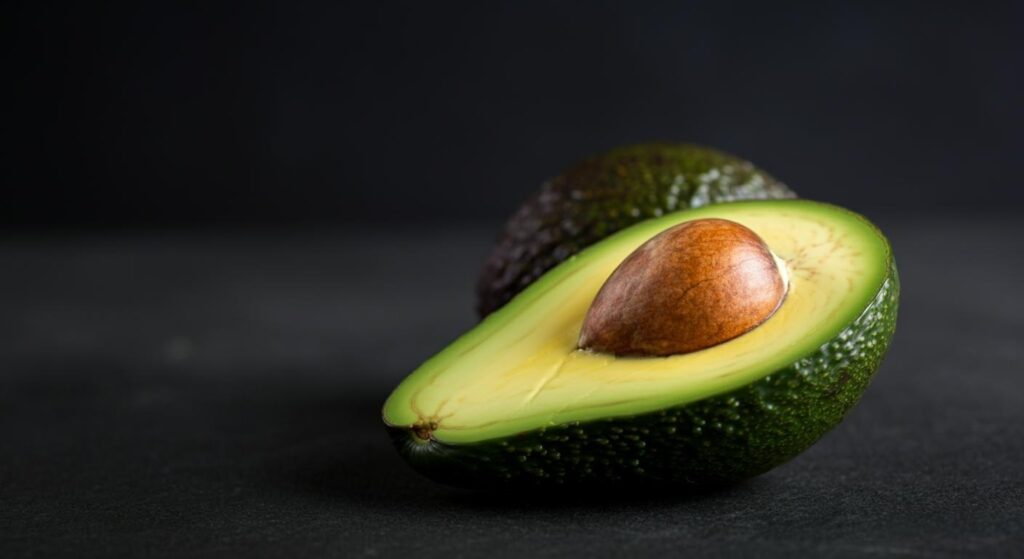
Whether you’re looking to improve your health, enhance your meals, or are simply curious about what’s in your food, understanding avocado nutrition is essential. Avocados are an exceptional source of healthy fats, fiber, vitamins, and antioxidants, making them a powerhouse for your body.
Key Health Benefits of Avocados
Avocados provide a wide range of health benefits, making them a must-have in a balanced diet. Here’s a quick look at why you should add them to your meals:
- Heart-Healthy Fats: Support cardiovascular health and help lower bad cholesterol.
- Fiber-Rich: Aids digestion, controls blood sugar, and helps with satiety.
- Packed with Essential Vitamins: Including Vitamin K, C, E, and B6.
- Cholesterol-Free: Naturally free from cholesterol.
- Rich in Antioxidants: Help protect cells from oxidative damage.
In this article, we’ll take you through everything you need to know about avocados and how they can elevate your diet. From their impressive nutrient content to creative ways to incorporate them into your meals, you’ll see why nutritionists recommend avocados as a staple in a balanced diet.
By the end of this guide, you’ll be ready to make informed choices about including this versatile fruit in your daily routine. Whether you’re an avocado enthusiast or new to the world of this creamy fruit, get ready to unlock the many health benefits that avocados have to offer!
What’s in an Avocado? A Nutrient Breakdown
Avocados are an incredibly nutrient-dense food. Here’s a breakdown of what a typical 100-gram serving provides:
- 160 calories
- 14.7 grams of fat
- 8.5 grams of carbohydrates
- 6.7 grams of fiber
- 2 grams of protein
These nutritional values illustrate why avocados are considered one of the most nutrient-packed fruits available.

Avocado Calories: What You Need to Know
- Whole Avocado: About 320 calories.
- Half an Avocado: Approximately 160 calories.
- Quarter of an Avocado: Roughly 80 calories.
While avocados are more calorie-dense than other fruits (e.g., 100g of apple has 52 calories and a banana contains 89 calories), they offer far more nutritional value in terms of healthy fats, fiber, and vitamins.
Avocado’s Vitamin Profile: What’s Inside?
Avocados are rich in several essential vitamins, making them a nutritional powerhouse. Here’s a look at the key vitamins they contain:
- Vitamin K: Supports blood clotting and bone health.
- Vitamin C: Strengthens the immune system.
- Vitamin E: Acts as a powerful antioxidant.
- B-Vitamins: Support energy production.
- Vitamin A: Promotes healthy vision.
This vitamin profile makes avocados an excellent addition to any diet.

Exploring Avocado Fat Content
Avocados are rich in healthy fats, particularly monounsaturated fats. Here’s the breakdown of fat content in a 100g serving:
- 9.8g of monounsaturated fats
- 1.8g of polyunsaturated fats
- 2.1g of saturated fats
These healthy fats are beneficial in several ways:
- Absorption of Nutrients: They help your body absorb fat-soluble vitamins (like A, D, E, and K).
- Satiety: They help you feel full longer, which can support healthy weight management.
- Heart Health: They support cardiovascular health by reducing bad cholesterol levels.
This makes the fat in avocados not only healthy but essential for overall wellness.
How Avocado Fiber Benefits Digestion
A whole avocado provides 13.4 grams of fiber, covering around 54% of your daily fiber needs. This fiber includes both soluble (2.1g) and insoluble (4.6g) types, which promote digestive health by:
- Supporting healthy digestion: Prevents constipation and promotes regular bowel movements.
- Maintaining steady blood sugar: Helps avoid spikes and crashes in blood sugar.
- Promoting fullness: Helps you feel satisfied longer, reducing overall calorie intake.
Incorporating avocados into your diet can significantly improve your digestive health.
| Nutrient | Amount per 100g | % Daily Value |
|---|---|---|
| Calories | 160 | – |
| Total Fat | 14.7 g | 22% |
| Saturated Fat | 2.1 g | 10% |
| Monounsaturated Fat | 9.8 g | – |
| Polyunsaturated Fat | 1.8 g | – |
| Trans Fat | 0 g | – |
| Cholesterol | 0 mg | 0% |
| Sodium | 7 mg | 0% |
| Total Carbohydrate | 8.5 g | 3% |
| Dietary Fiber | 6.7 g | 24% |
| Total Sugars | 0.66 g | – |
| Protein | 2 g | 4% |
| Vitamins | ||
| Vitamin A | 7 mcg | 1% |
| Vitamin C | 10 mg | 11% |
| Vitamin E | 2.07 mg | 14% |
| Vitamin K | 21 mcg | 18% |
| Folate (B9) | 81 mcg | 20% |
| Vitamin B6 | 0.29 mg | 15% |
| Minerals | ||
| Potassium | 485 mg | 12% |
| Magnesium | 29 mg | 7% |
| Calcium | 18 mg | 2% |
| Iron | 0.55 mg | 3% |
| Copper | 0.19 mg | 10% |
The Health Benefits of Eating Avocados
Regular consumption of avocados can enhance your overall health in several impactful ways:
- Heart Health: Avocados help lower bad cholesterol (LDL) and increase good cholesterol (HDL) levels.
- Cell Protection: The antioxidants found in avocados protect your cells from oxidative damage.
- Skin and Vision Health: The vitamins and minerals in avocados promote healthy skin and vision.
These benefits, combined with the fruit’s rich nutrient content, make it a powerful addition to any diet. These benefits, combined with their rich nutrient profile, make avocados a powerful addition to any diet. The health benefits of avocado consumption extend to blood sugar control and inflammation reduction.
The fruit’s natural compounds help your body absorb nutrients from other foods better, especially fat-soluble vitamins like A, D, E, and K. This makes avocados particularly valuable when eaten with other vegetables.
Avocado for Weight Loss
Can avocados help with weight loss? Despite their high calorie content, avocados can be helpful in weight management. The combination of healthy fats and fiber helps you feel full longer, reducing the urge to snack between meals. Studies show that people who eat avocados regularly tend to maintain healthier body weights.
To include avocados in a weight-loss diet:
- Replace unhealthy fats with avocado
- Add small portions to meals for satiety
- Use as a spread instead of butter
- Include in breakfast to start the day feeling full
Avocado Keto Diet
Avocados are ideal for ketogenic diets due to their unique nutritional profile. The avocado nutrition facts for keto dieters show why they’re a perfect fit: high in healthy fats, low in net carbs, and rich in essential nutrients. A typical avocado contains only 2 net carbs per 100 grams, making it an excellent choice for maintaining ketosis.
For keto dieters, avocados provide:
- Healthy fats for energy
- Electrolytes like potassium
- Fiber for digestive health
- Minerals often lacking in keto diets
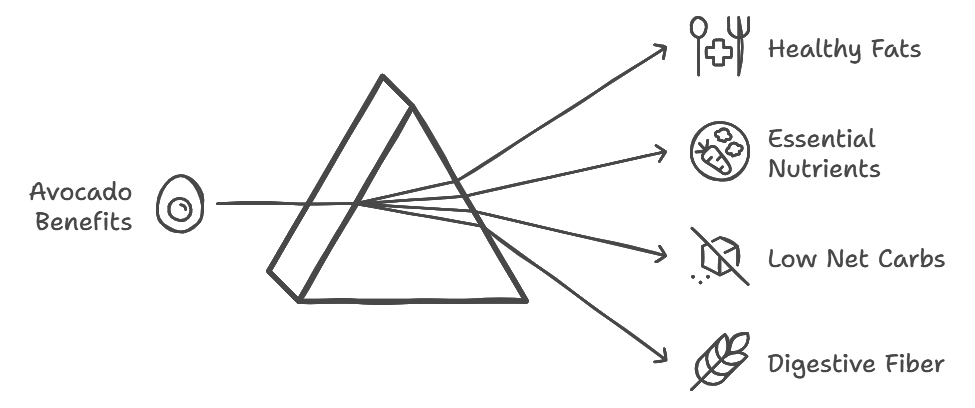
Avocado Protein Content
How much protein is in an avocado? A medium avocado contains about 4 grams of protein, which is modest compared to traditional protein sources but significant for a fruit. While not a complete protein source, avocados complement other plant-based proteins well.
Protein comparison per 100g:
- Avocado: 2g
- Black beans: 8.9g
- Chickpeas: 8.9g
- Quinoa: 4.4g
While avocados shouldn’t be relied upon as a primary protein source, they serve as a beneficial addition to meals that include other protein-rich foods. Their protein content, combined with healthy fats and fiber, makes them an excellent component of plant-based diets, supporting muscle maintenance and overall nutrition when eaten as part of a balanced diet.
Comparing Avocado Nutrition Facts: Portions, Other Fruits, and Daily Consumption
Understanding avocado portions helps with meal planning. How many calories in a whole avocado? depends on size, but here’s a general breakdown:
A medium avocado (200g):
- Whole: 320 calories
- Half: 160 calories
- Quarter: 80 calories
- Two tablespoons: 50 calories
These numbers matter for portion control. Many recipes call for half an avocado, which provides enough nutrients without excessive calories. When watching your calorie intake, you can adjust portion sizes – even a quarter avocado adds richness and nutrition to meals.
Avocado Nutritional Comparison with Other Fruits
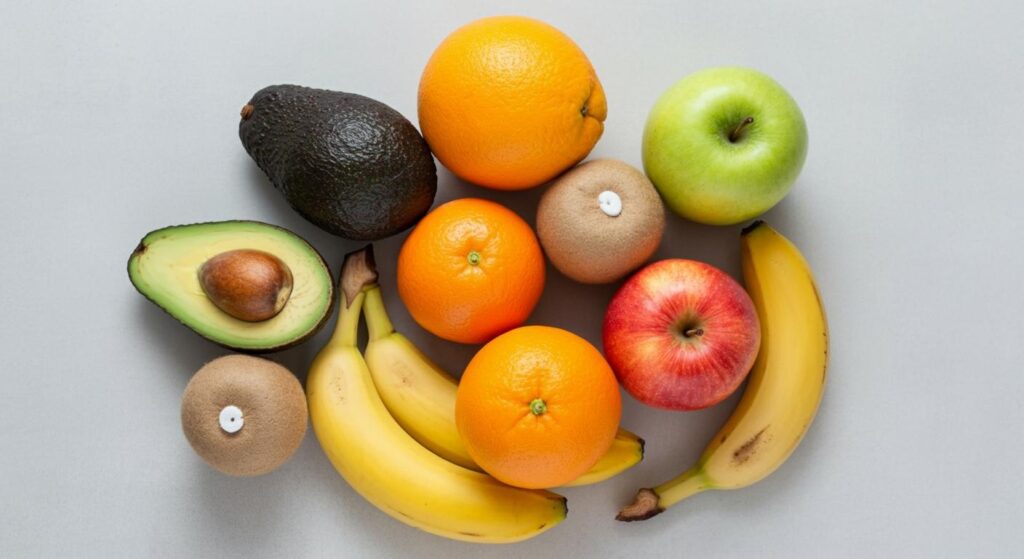
Avocados differ significantly from typical fruits. Here’s how they compare per 100g serving:
Avocado:
- 160 calories
- 15g healthy fats
- 7g fiber
- 2g protein
Banana:
- 89 calories
- 0.3g fat
- 2.6g fiber
- 1.1g protein
Apple:
- 52 calories
- 0.2g fat
- 2.4g fiber
- 0.3g protein
Orange:
- 47 calories
- 0.1g fat
- 2.4g fiber
- 0.9g protein
Unlike most fruits that are high in natural sugars, avocados stand out for their healthy fats and lower sugar content. They also provide more fiber and protein than typical fruits, making them more filling and nutritionally distinct. Found this article useful? Share it with your friends who need a little avocado goodness in their lives!
Is it Safe to Eat an Avocado Every Day?
Eating an avocado daily is generally safe and can be beneficial for most people. However, consider these factors:
Benefits of daily consumption:
- Consistent source of healthy fats
- Steady supply of essential nutrients
- Support for heart health
- Aid in nutrient absorption
Points to consider:
- Watch total daily calories
- Consider your fat intake from other sources
- Monitor portion sizes
- Account for cost in your food budget
For most healthy adults, eating an avocado daily poses no risks and offers numerous benefits. However, if you’re watching calories or on a special diet, you might want to adjust portion sizes. Some people might need to eat smaller amounts, especially if they’re new to eating avocados or have specific dietary restrictions.
Those with latex allergies should be cautious, as avocados can trigger similar reactions in sensitive individuals. If you have specific health conditions or concerns, it’s wise to consult with a healthcare provider about including avocados in your daily diet.
Remember that variety in diet is important – while avocados are nutritious, they should be part of a balanced eating plan that includes many different healthy foods.
Actionable Tips & Takeaways
To help you incorporate more avocados into your daily routine, here are some simple, actionable tips:
- Add Avocado to Your Smoothies: Blend half an avocado into your morning smoothie for a creamy texture and a boost of healthy fats that will keep you feeling satisfied longer.
- Substitute Avocado for Butter: Mash avocado and use it as a healthier alternative to butter in baking recipes. It’s especially great for muffins, brownies, or toast.
- Use Avocado as a Salad Topper: Add slices or chunks of avocado to your salads for a creamy, nutrient-dense topping that enhances both flavor and nutrition.
- Avocado Toast for Breakfast: Spread mashed avocado on whole grain toast and top with a sprinkle of salt, pepper, and your favorite herbs for a nutritious, filling breakfast.
- Make Guacamole for a Healthy Snack: Combine mashed avocado with lime juice, garlic, and a pinch of salt to make a fresh guacamole dip. Pair it with veggie sticks or whole grain crackers for a satisfying snack.
- Add to Sandwiches or Wraps: Use avocado slices as a filling in sandwiches, wraps, or as a topping for burgers. It can replace mayonnaise or other high-fat spreads for a healthier option.
- Try Avocado in Eggs: Add avocado slices to your scrambled eggs or omelets for an extra dose of healthy fats and creaminess.
- Frozen Avocado Cubes: Freeze small chunks of avocado and add them to smoothies or salads for a cold, refreshing addition. It also helps preserve their freshness.
- Use Avocado in Desserts: Avocados can be blended into desserts like chocolate mousse or puddings. The creamy texture of avocado makes it an excellent substitute for dairy or heavy cream in many dessert recipes.
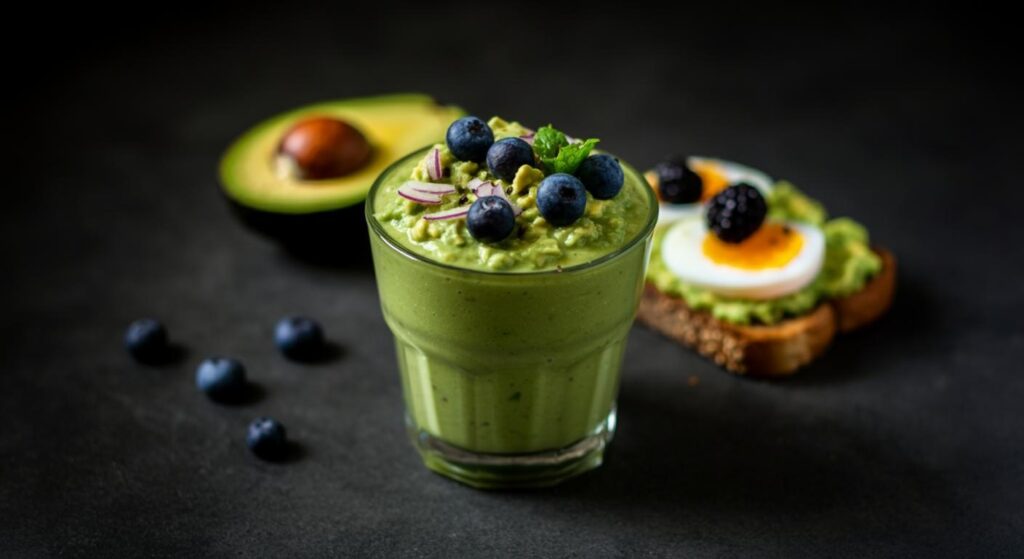
Making Avocados Part of Your Healthy Diet: Final Thoughts
When we look at the complete picture of avocado nutrition facts, it’s clear why this fruit has gained such popularity in healthy eating plans. From essential nutrients to versatile uses in meals, avocados offer a unique combination of benefits that few other foods can match.
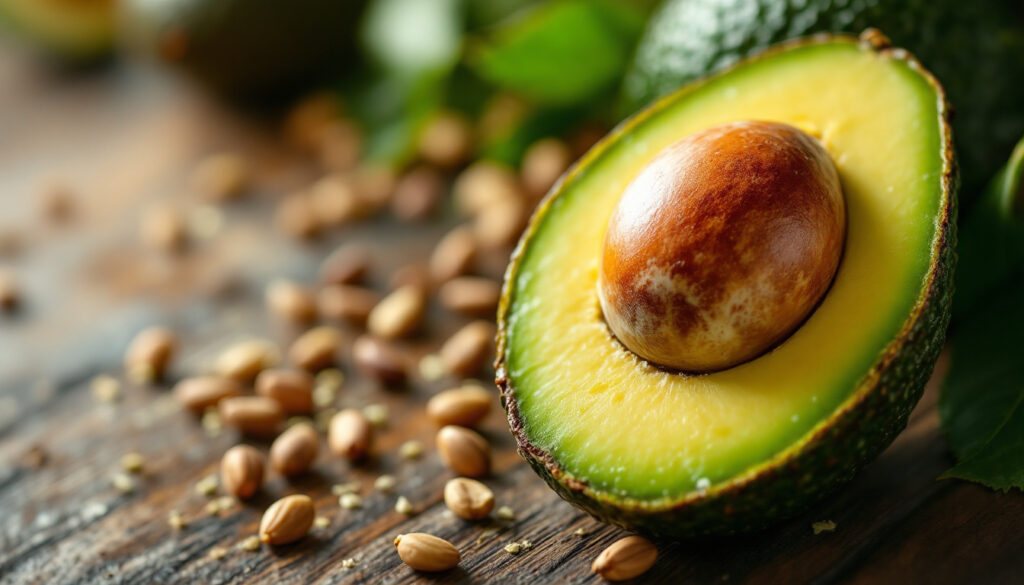
The health benefits of eating avocados regularly are substantial and well-documented. These include:
- Heart health support through healthy fats
- Better nutrient absorption from other foods
- Improved satisfaction after meals
- Support for healthy weight management
- Enhanced diet quality overall
As we’ve seen throughout this guide, avocados can fit into many eating styles, whether you’re following a keto diet, trying to lose weight, or simply aiming to eat more nutritiously. Their creamy texture and mild flavor make them easy to include in various dishes, from breakfast to dinner.
For best results in your diet:
- Start with small portions if you’re new to avocados
- Listen to your body’s response
- Adjust serving sizes based on your caloric needs
- Use them to replace less healthy fats in your diet
Remember that while avocados are nutrient-rich, they should be part of a varied diet that includes plenty of other healthy foods. By understanding their nutritional value and using them wisely, you can enjoy the many benefits this remarkable fruit has to offer while maintaining a balanced approach to eating. Do you love avocados? Let us know in the comments how you incorporate them into your meals.
Frequently Asked Questions About Avocado Nutrition Facts
Here are answers to common questions about avocados’ nutritional value and health benefits. These answers provide quick, reliable information to help you make informed decisions about including avocados in your diet.
How many calories are in a whole avocado?
A medium whole avocado (about 200g) contains approximately 320 calories. However, calories can vary based on size – a small avocado may have around 250 calories, while a large one could contain up to 400 calories.
What are the health benefits of eating avocados regularly?
Regular avocado consumption supports heart health, helps control blood sugar, aids nutrient absorption, and provides antioxidant protection. They also support brain health, eye health, and maintain healthy skin.
Is the fat content in avocados healthy?
Yes. Most fat in avocados is monounsaturated (about 15g per avocado), which is heart-healthy. These fats help lower bad cholesterol while raising good cholesterol and aid in absorbing nutrients from other foods.
How much fiber is in an avocado, and how does it benefit digestion?
A whole avocado contains about 13.4g of fiber. This fiber aids digestion by preventing constipation, feeding beneficial gut bacteria, and helping maintain regular bowel movements. It also helps control blood sugar and promotes feelings of fullness.
Can avocados help with weight loss?
es, despite their high calorie content, avocados can support weight loss. Their combination of fiber and healthy fats helps you feel full longer, reducing overall calorie intake. They also help stabilize blood sugar, which can prevent hunger spikes.
Are avocados a good choice for a keto diet?
Absolutely. Avocados are perfect for keto diets because they’re high in healthy fats and very low in net carbs (about 2g per 100g). They also provide essential nutrients that can be lacking in keto diets.
What vitamins and minerals are found in avocados?
Avocados are rich in vitamins K, C, E, B6, and folate. They also contain potassium, magnesium, and copper. This combination supports immune function, bone health, and energy production.
How does avocado nutrition compare to other fruits?
Unlike most fruits, avocados are low in sugar and high in healthy fats. They contain more calories but also more fiber and healthy fats than typical fruits. While an apple has about 52 calories per 100g, avocados have 160 calories, but with more nutrients.
Is it safe to eat an avocado every day?
Yes, eating an avocado daily is safe for most people. However, watch your portion sizes and total calorie intake. Those with latex allergies should be careful, as avocados can trigger similar reactions.
What is the protein content in avocados, and how does it compare to other foods?
A whole avocado contains about 4g of protein. While this is more than most fruits, it’s less than traditional protein sources like beans (8.9g per 100g) or meat. Avocados should be considered a complement to, not a replacement for, primary protein sources.








